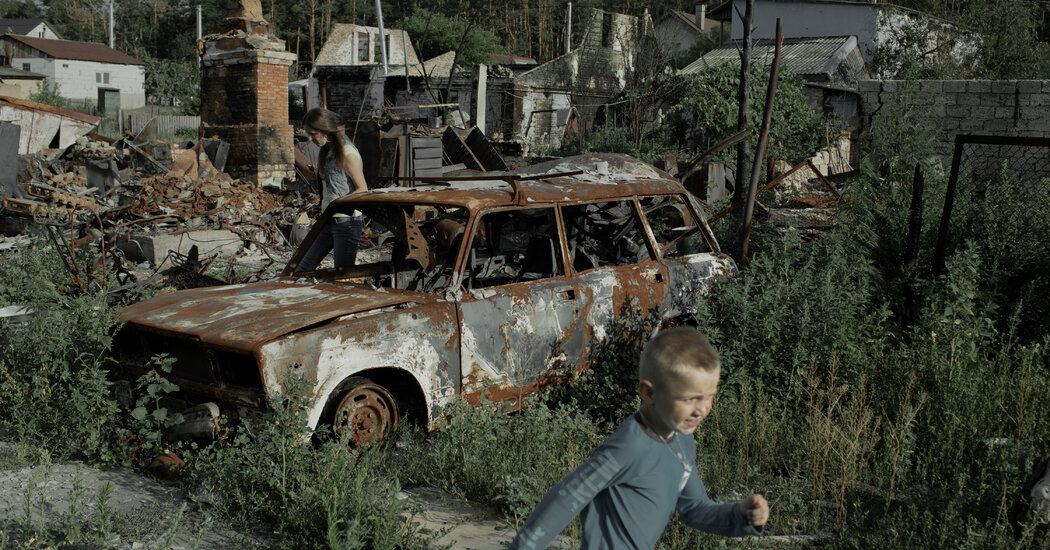

No victim of war emerges without suffering some kind of loss: A home eviscerated. A loved one vanished. A life snatched away.
Yet no one loses as much to war as children — scarred by its ravages for a lifetime.
In Ukraine, time is dwindling to prevent another “lost generation” — the oft-used expression not only for young lives taken, but also for the children who sacrifice their education, passions and friendships to shifting front lines, or suffer psychological scars too deep to be healed.
The online ticker at the top of a Ukrainian government page, “Children of War” flickers with a grim and steadily rising tally: Dead: 361. Wounded: 702. Disappeared: 206. Found: 4,214. Deported: 6,159. Returned: 50.
“Every one of Ukraine’s 5.7 million children have trauma,’’ said Murat Sahin, who represents the United Nations children’s agency, UNICEF, in Ukraine. “I wouldn’t say that 10 percent or 50 percent of them are OK — everyone is experiencing it, and it takes years to heal.”
According to humanitarian agencies, more than a third of Ukrainian children — 2.2 million — have been forced to flee their homes, with many of them displaced two or three times, as territory is lost. Over half of Ukraine’s children — 3.6 million — may not have a school to go back to come September.
Yet even with war moving into its sixth month, children’s advocates say there is time to make meaningful changes to how young people emerge from the conflict.
In Lviv’s maternity wards, mothers pray that the fighting ends before their infants are old enough to remember it. In eastern Ukraine, activists search for children who disappeared across the front lines. Across the country, aid workers and Ukrainian officials are scrambling to repair bombed-out schools and start psychological support.
“We believe in the resilience of children,” said Ramon Shahzamani, the chairman of War Child Holland, a group that focuses on psychological and educational support for children in conflict zones.
“If you’re able to reach children as soon as possible, and help them deal with what they have experienced and what they have seen,” he said, “then they are able to deal with their emotions.”
That resilience is evident in the way that children have adapted their daily lives — scribbling drawings in crayon and paint on the wall of a dank basement where they are held captive, or inventing a game based on the frequent checkpoint stops they are subjected to. They mimic the grim reality they witness in the war, but also find ways to escape it.
In the Donbas, a 13-year-old girl named Dariia no longer flinches, or runs, when a shell hits nearby, so accustomed is she to the terror that erupts daily.
Even so, there is the cost of unhealed psychological trauma. And the effects are not only mental, but also physical.
Children exposed to war are at risk of “toxic stress,” a condition triggered by extreme periods of adversity, said Sonia Khush, the director of Save the Children in Ukraine. The effects are so powerful that they can alter brain structures and organ systems, lasting long into children’s adult lives.
Offering a hopeful path through war is not just for Ukraine’s children today, Mr. Shahzamani said. It is for the sake of the country’s future, too.
The War Child group recently surveyed children and grandchildren of those who lived through World War II, and found that families even two generations later were affected by wartime traumas.
“War is intergenerational,” he said. “That is why it is extremely important to work on the well-being and mental health of children.”
Education is critical to psychological support, Ms. Khush said. Schools provide children with social networks among peers, guidance from teachers and a routine that can provide a sense of normalcy amid pervasive uncertainty.
More than 2,000 of Ukraine’s approximately 17,000 schools have been damaged by war, while 221 have been destroyed, according to United Nations statistics. Another 3,500 have been used to shelter or assist the seven million Ukrainians who have fled to safer parts of the country. No one knows how many will open when the academic year starts a month from now.
The social destruction is even harder to repair. Thousands of families have been ripped apart as brothers and fathers have been conscripted or killed, and children forced to flee, leaving grandparents and friends behind. Aid workers have noticed a growing problem of nightmares and aggressive behavior in young children.
Before the invasion, Ukraine had about 91,000 children in institutional orphanages, more than half with disabilities, Mr. Sahin said. No tally has been released for how much that number has climbed since the war began.
One of the major unknowns of the war is the number of children orphaned or separated from their parents. But apart from those orphaned, Moscow has also forcibly deported tens of thousands of Ukrainians into Russia, according to Ukrainian officials. Many are believed to be children separated from their parents.
Now, Ukrainian activists are using clandestine networks inside Russian-held territories to try to get information on those children — and, if possible, bring them back.
There is hope for orphans, too. A new effort led by the Ukrainian government and UNICEF has encouraged about 21,000 families to register as foster families. Already, 1,000 of them are trained and taking children in.
“It’s just the beginning,” Maryna Lazebna, Ukraine’s minister of social policy, said recently. “Sometimes destruction encourages building something new, not rebuilding the past.”



